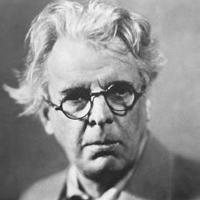Truth of Human Life in Yeats's Poetry
William Butler Yeats's later poetry is particularly characterized by a stark, naked, brutal and even coarse truth about the fragmentation of modern human life. The poet was caught "between two worlds." His poetry reflects the clash of opposites. Yeats saw man as torn in conflict. For him, the human existence is made up of antinomies: the spiritual and the physical, the sensuous and the artistic, the past and the present, the personal and the impersonal, physical decay and intellectual maturity. These conflicts are ever present in Yeats' poetry.

William B. Yeats (1865-1939)
To Yeats, the modern civilization has made our fundamental consciousness of ourselves so blunt that we have not been able to differentiate between our own inner voice and the reason. The rise of democracy and mob (mafia) violence which he witnessed in Ireland and Europe did not appeal to him. He felt that these events reflected a brutalization of humanity. In A Prayer for My Daughter, he wishes that his daughter should remain free of "intellectual hatred" which has corrupted beauty and innocence. In a process of glorifying the ideals of democracy, Yeats spoke against it, or rather against the shape it was assumed in the civilization around him.
Yeats was not over-impressed by the scientific progress made by modern man. He foresaw the destruction and chaos looming large before his eyes. The sordid and common life led by the people, their imagination and spirit blunted and barren have disgusted Yeats. This view of the Irish people becomes a statement of universal validity in the twentieth century-the truth of which may, of course, is unpalatable and unpopular. In Easter 1916, Yeats celebrates the transformation of the Irish people under the spell of violence. For once, they "resigned their parts in the causal comedy"-a woman who spent her days in "ignorant good-will" and "her nights in argument", and the "drunken vainglorious lout" were transformed. "A terrible beauty is born" the sordidness has been discarded to show vitality and a spirit of independence. But, Yeats raised hidden, but bitter truth and questioned on the martyrdom of the rebels "needless death after all"? However, unpopular, Yeats does not fear the truth.
The evil fragmentation of our civilization is best expressed in The Second Coming. Yeats bluntly puts the truth before us-"Things fall apart; the center cannot hold", and "anarchy is loosed upon the world". The fragmentation in our lives can cause disorder and corruption. The good people, unfortunately lack conviction, while the bad pursue their wicked ends with passionate intensity. The falcon, the symbol of intellectual power, has got free of the control of the falconer, who represents the heart or soul. In other words, the intellect's progress is directionless at these times, and separated from human instinct. In such a situation, the future seems bleak-a brutal and savage force is about to take over. All this might have sounded pessimistic and certainly unappealing to his readers, but we cannot deny the basic truth of his vision. In the situation, Yeats wants to seek some kind of beauty and permanence beyond all the ugliness, corruption and impurity. Thus, in his Sailing to Byzantium, the wish is not merely to escape sensuality and mortality, but also the impurity and corruption of this world-the "complexities of mire and blood". Byzantium presents the ideal world, free of the "dissipations and despairs" of the modern world, and, representing the unity of all aspects of life. In Byzantium, there is none of the multiplicities, hate, strife or confusion which is peculiar to the everyday life of men and women.
The Byzantium poems bear out the contention that Yeats presents the clashing opposites of the human situation "country-city, sensuality-intellectuality, dying-unageing, body-soul, flesh-spirit, holy-unholy". We may not agree with his way of reconciling the opposites, but we are fully conscious of the fragmentation in the human being and society of today. "Bodily decrepitude is wisdom; young/we loved each other and were ignorant", Yeats says in one of his poems. He was always bewildered by the problem of the dissociation of power and knowledge-again a fact true to the human situation. As he questions in Leda and the Swan, are we fully aware of the actions done or their significance? Man, according to Yeats, was faced with a fragmented life, unable to achieve the unity of being, where all contradictions are resolved. Only art and philosophy triumph over tragedy; only wisdom can teach us the value of tragic gaiety-that is his rejoinder to "hysterical women" who say that something "drastic" should be done. Byzantium to him represented that point in history where "religious, aesthetic and practical life was one and architects and artificers spoke to the multitude and few alike." All in all, Yeats' poems present the truth about the human situation and he does not hesitate to use blunt and brutal terms to express it.
Cite this Page!
Sharma, K.N. "Truth of Human Life in Yeats's Poetry." BachelorandMaster, 18 June 2017, bachelorandmaster.com/britishandamericanpoetry/truth-of-human-life-in-yeats-poetry.html.
Related Topics
The Scholars: Critical Analysis
Sailing to Byzantium: Analysis
The Theme of Immortality in Byzantium Poems
A Prayer for My Daughter: Analysis
Among School Children: Analysis
Crazy Jane Talks with the Bishop
The Lamentation of the Old Pensioner
He Wishes for the Clothes of Heaven
An Irish Airman Foresees his Death
When You Are Old: Summary and Analysis
William Butler Yeats as a Symbolist
Yeats and the Romantic Tradition
The Salient Features of Yeats's Poetry
Biography of William Butler Yeats
 |
bachelorandmaster.com |